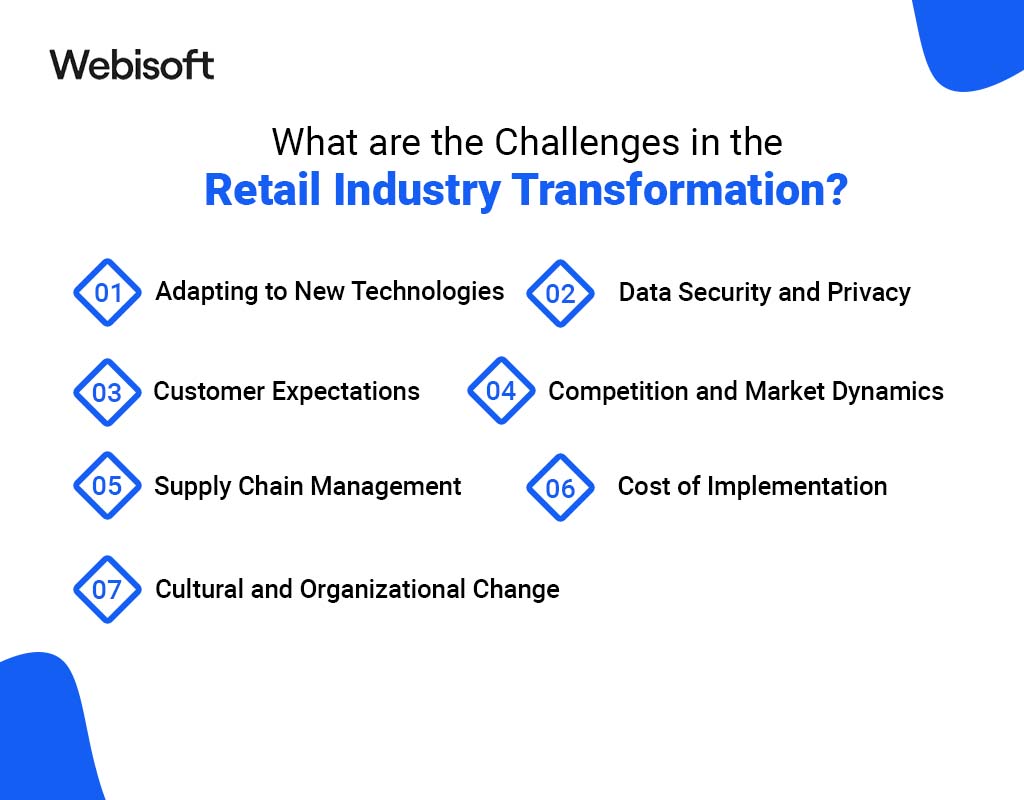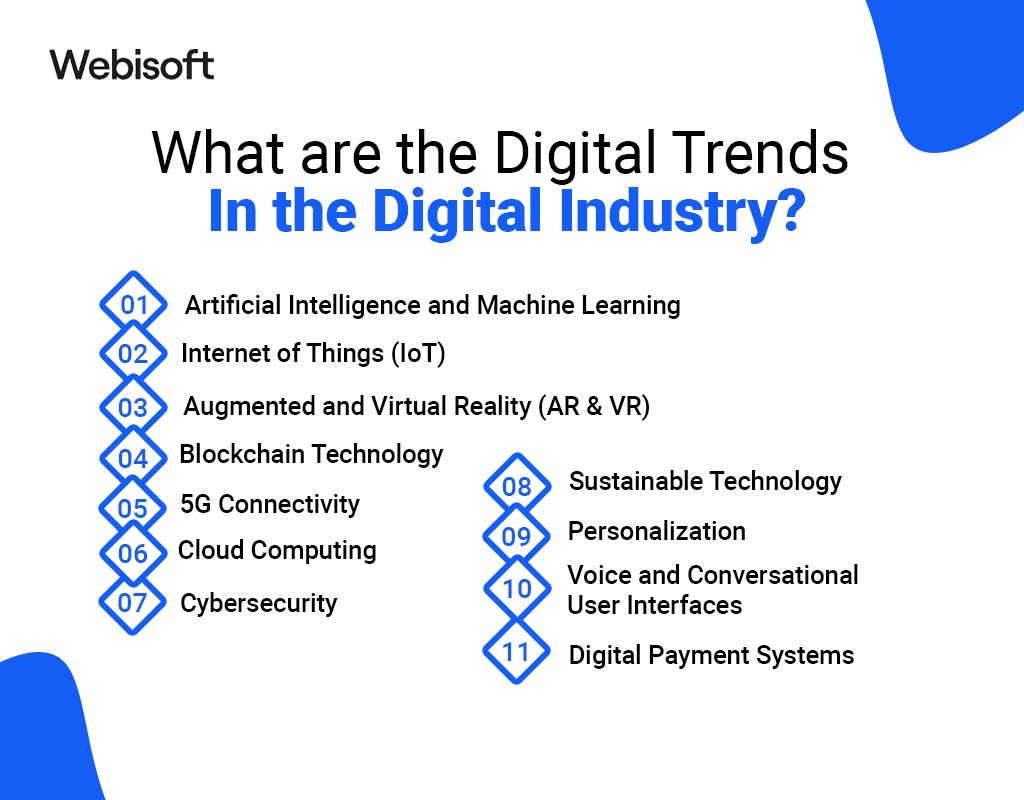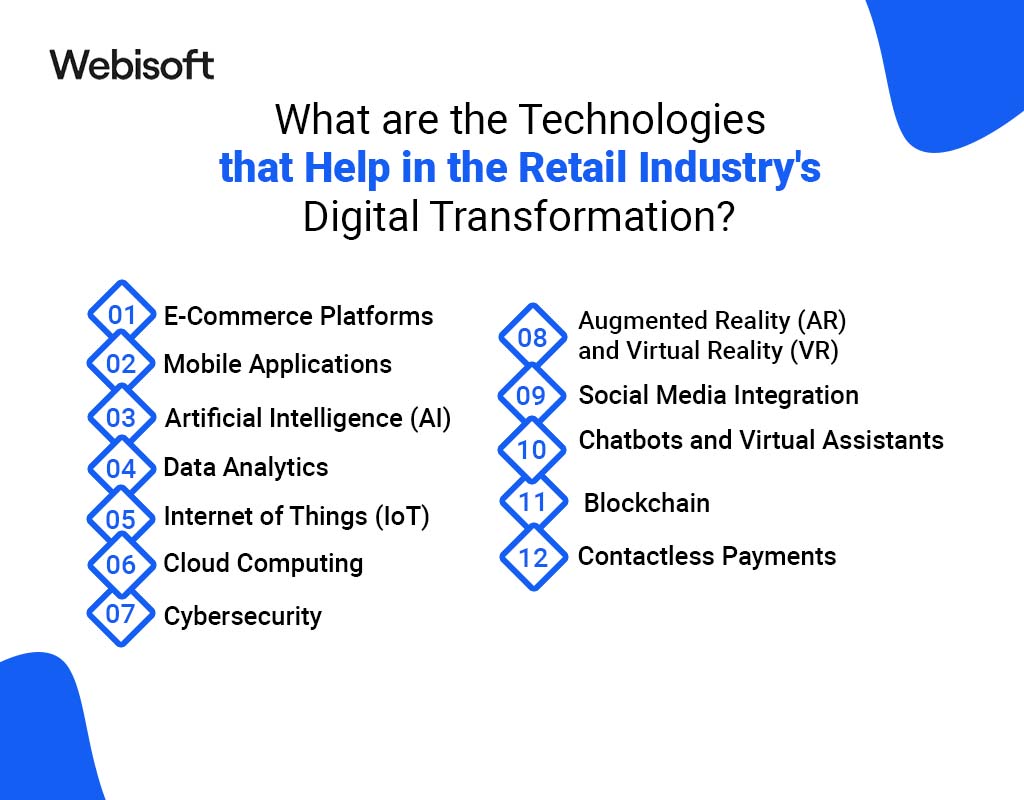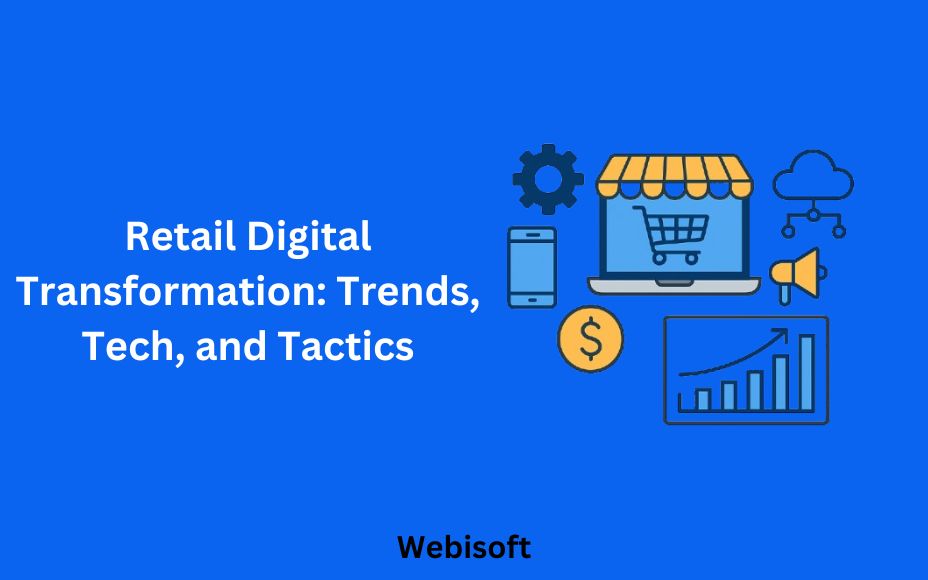The global spread of Coronavirus continues to affect everyone. If we don’t manage this pandemic soon, a worldwide economic downturn might happen. This situation has particularly hit the retail sector, stopping its growth and impacting physical stores significantly.
In recent months, the COVID-19 crisis has led to fewer customers in the retail sector across various countries. This change has brought complex challenges for many businesses. The pandemic has pushed retailers to adapt and consider digital solutions.
Retailers are now pondering their next steps in this sudden shift. They’re exploring how technology can help them develop new business strategies and increase profits. Thus, examining all facets of retail digital transformation in the retail sector is crucial.
Before discussing how retail businesses can move to digital operations to enhance customer experience and boost revenue, we need to grasp what digital transformation is and what it means for the retail industry.
Contents
- 1 What is Digital Transformation in the Retail Industry?
- 2 What are the Challenges in the Retail Industry Transformation?
- 3 What are the Digital Trends in the Digital Industry?
- 3.1 Artificial Intelligence and Machine Learning
- 3.2 Internet of Things (IoT)
- 3.3 Augmented and Virtual Reality (AR & VR)
- 3.4 Blockchain Technology
- 3.5 5G Connectivity
- 3.6 Cloud Computing
- 3.7 Cybersecurity
- 3.8 Sustainable Technology
- 3.9 Personalization
- 3.10 Voice and Conversational User Interfaces
- 3.11 Digital Payment Systems
- 4 What are the Technologies that Help in the Retail Industry’s Digital Transformation?
- 5 Final Note
- 6 Frequently Asked Questions
What is Digital Transformation in the Retail Industry?
The retail industry’s digital transformation revolutionizes how businesses operate and interact with customers. By integrating digital technology, retail businesses can enhance their efficiency, customer experience, and market reach.
This transformation often involves using e-commerce platforms, data analytics, AI, and other digital tools to innovate in sales, marketing, and customer service. The essence of digital transformation lies in adopting new technologies to meet changing consumer demands.
Retailers are reimagining shopping experiences, making them more personalized and accessible. For instance, online shopping options complement traditional in-store experiences, providing customers with more convenience and choice.
What are the Challenges in the Retail Industry Transformation?
Digital transformation in the retail industry is a multifaceted process. It involves embracing new technologies to improve customer experiences and operational efficiency.
However, this journey is fraught with challenges like adapting to new technologies, ensuring data security, meeting customer expectations, managing competition, streamlining supply chains, managing costs, and fostering cultural change.

Adapting to New Technologies
The retail sector often grapples with the pace of technological advancements. Retailers must choose relevant technologies and train their staff accordingly. The challenge is not just about adopting new tools but also about integrating them seamlessly into existing systems.
Data Security and Privacy
As digital transformation involves handling large amounts of customer data, ensuring security and privacy becomes paramount. Retailers face the task of protecting sensitive information from cyber threats while complying with data protection laws.
Customer Expectations
Today’s consumers expect a seamless, omnichannel shopping experience. Meeting these expectations requires retailers to constantly innovate and improve their digital offerings, which can be costly and complex.
Competition and Market Dynamics
The digital arena has intensified competition in retail. Smaller retailers especially find it challenging to compete with larger, more established players with greater digital initiative resources.
Supply Chain Management
Modernizing supply chains with digital technologies is vital but challenging. Retailers must make sure that their supply chains are efficient, transparent, and adaptable to changes in market demand. Supply chain retail digital transformation is one of the key aspects to consider.
Cost of Implementation
Investing in digital transformation can be expensive. The cost of new technologies and the need for skilled personnel to manage them pose a significant financial challenge, especially for smaller retailers.
Cultural and Organizational Change
Digital transformation needs a shift in company culture and mindset. Employees at all levels must embrace change, which can be a major hurdle in traditionally structured organizations.
What are the Digital Trends in the Digital Industry?
The digital industry constantly evolves, introducing new trends and innovations. This guide will take you through some of the key retail digital transformation trends. So, let’s start!

Artificial Intelligence and Machine Learning
Artificial Intelligence (AI) and Machine Learning (ML) are revolutionizing various sectors. These technologies help analyze data patterns, automate tasks, and enhance user experiences.
Businesses are adopting AI for customer service, retail digital transformation strategy, predictive analytics, and personalized marketing. Machine learning algorithms improve over time, making them more efficient in decision-making processes.
Internet of Things (IoT)
IoT connects everyday devices to the internet, enabling them to send and receive data. This technology is making homes smarter and industries more efficient. IoT enhances operational efficiency and provides new insights, from smart thermostats to connected manufacturing equipment.
Augmented and Virtual Reality (AR & VR)
AR and VR are transforming entertainment, education, and even healthcare. These technologies provide immersive experiences, making learning and entertainment more interactive.
In healthcare, they assist in complex surgeries and patient care. Retailers use AR for virtual try-ons, improving the shopping experience.
Blockchain Technology
Blockchain is gaining popularity beyond cryptocurrencies. Its application in securing digital transactions and data is noteworthy. Industries like healthcare, finance, business, and supply chain management use blockchain for transaction transparency and security.
5G Connectivity
5G technology aims for faster internet speeds, faster technology, and more reliable connections.
This advancement is crucial for technologies like autonomous vehicles and telemedicine, where real-time data transfer is essential. 5G is set to transform how we interact with online services and devices.
Cloud Computing
Cloud computing offers flexible, scalable, and cost-effective data storage and management solutions. It enables remote work, data backup, and disaster recovery. Businesses are leveraging cloud services for better collaboration and efficiency.
Cybersecurity
As digital adoption increases, so does the importance of cybersecurity. Protecting data and digital assets from cyber threats is a top priority. Regular updates, secure networks, and awareness training are essential in safeguarding against cyber attacks.
Sustainable Technology
Sustainable technology focuses on reducing the environmental impact of digital activities. This trend includes energy-efficient data centers, e-waste recycling, and green computing practices. This approach is crucial for creating a sustainable digital future.
Personalization
Personalization uses data to tailor digital experiences to individual preferences. From personalized marketing campaigns to customized product recommendations, this trend is enhancing customer engagement and satisfaction.
Voice and Conversational User Interfaces
Voice-activated assistants and conversational interfaces are making technology more accessible. They simplify user interactions with devices and applications, offering a more natural and intuitive way to engage with technology.
Digital Payment Systems
Digital payment systems have become more prevalent, offering convenience and security. These systems transform how we handle transactions from mobile wallets to contactless payments.
These trends are shaping the future of the digital industry, offering exciting opportunities and challenges. Staying informed and adaptable is critical to navigating this dynamic landscape.
What are the Technologies that Help in the Retail Industry’s Digital Transformation?
These technologies are collectively transforming the retail landscape. They enhance customer experiences, streamline operations, and open new avenues for business growth and innovation. Retailers who effectively leverage these technologies will likely gain a competitive edge.

E-Commerce Platforms
E-commerce platforms are the cornerstone of retail digital transformation. They facilitate online shopping, offering a diverse range of products and services.
These platforms are designed to be user-friendly, providing a seamless shopping experience. They also enable retailers to reach a global audience, breaking geographical barriers.
Mobile Applications
Mobile apps in retail are changing the way consumers shop. They offer personalized shopping experiences, notify customers about sales or new products, and allow easy browsing and purchasing.
Retail apps often have features like wish lists, easy checkout, and order tracking, enhancing shopping convenience.
Artificial Intelligence (AI)
AI is revolutionizing retail in multiple ways. From personalizing customer interactions to optimizing inventory management, AI’s role is pivotal.
It analyzes customer data to predict trends and preferences, enabling retailers to offer customized recommendations. AI also aids in efficient supply chain management and enhances demand forecasting accuracy.
Data Analytics
Data analytics tools help retailers understand their customers better. Retailers can make informed decisions by analyzing purchase history, browsing behavior, and customer feedback. This data-driven approach aids in tailoring marketing strategies and improving product offerings.
Internet of Things (IoT)
IoT devices like sensors and RFID tags help in automating inventory management. They track the availability and movement of products, ensuring accurate stock levels. IoT also enables smart shelving systems, enhancing in-store customer experiences.
Cloud Computing
Cloud technology offers scalable and flexible data storage solutions. It supports the vast data requirements of the retail industry, ensuring efficient data management and security. Cloud computing also facilitates collaboration and data sharing across various locations and departments.
Augmented Reality (AR) and Virtual Reality (VR)
AR and VR create immersive shopping experiences. Customers can visualize products in a virtual environment, which helps in making informed purchase decisions. These technologies are particularly effective in sectors like fashion and home decor.
Social Media Integration
Integrating social media with retail strategies enhances brand visibility and customer engagement. Retailers use social media for targeted advertising, customer service, and gathering customer feedback. It also serves as a platform for launching new products and promotional campaigns.
There are many tools that can help you create ads, ranging from graphic design platform to specialized ad maker, allowing you to tailor your promotional content to effectively reach and engage your target audience.
Chatbots and Virtual Assistants
Chatbots and virtual assistants provide 24/7 customer support. They handle inquiries, assist in shopping, and offer personalized recommendations. These automated services improve customer satisfaction and free up human resources for more complex tasks.
Blockchain
Blockchain technology brings transparency and security to retail transactions. It’s instrumental in supply chain management, ensuring the authenticity and traceability of products. Blockchain also reduces the risk of fraud and improves transaction efficiency.
Contactless Payments
The contactless payment methods have made transactions quicker and more secure. This technology simplifies the checkout process and is preferred by customers for its convenience.
Final Note
Transforming digitally in the retail sector seems promising, especially after learning about various technologies and their applications in retail digital transformation. However, the real challenge is figuring out where to start.
As a retailer, developing a digital transformation strategy that responds to evolving consumer needs and market trends is crucial.
The simplest and quickest way to achieve this transformation is by partnering with the right expert, Webisoft. Webisoft is a partner with both technical savvy and industry knowledge. We can guide you through a complete business overhaul.
Our team has extensive expertise in business analytics, IoT integration, data-driven strategies, and enhancing user engagement. If you have ideas but need technological guidance, contact our skilled professionals. We’re here to support you at every step of your retail digital transformation consulting journey.
Frequently Asked Questions
What technologies are driving retail digital transformation?
Key technologies include e-commerce platforms, mobile apps, AI and machine learning, data analytics, and IoT (Internet of Things) devices.
How does digital transformation impact customer experience?
It enhances customer engagement through personalized shopping experiences, seamless online and in-store interactions, and improved customer service.
Can small retailers benefit from digital transformation?
Absolutely! Digital tools can help small retailers compete with larger chains by improving efficiency, reaching new customers, and offering unique, personalized services.
How should retailers start their digital transformation journey?
Begin by evaluating current digital capabilities and understanding customer needs. Then, gradually implement technologies aligning with your business goals and expectations.
